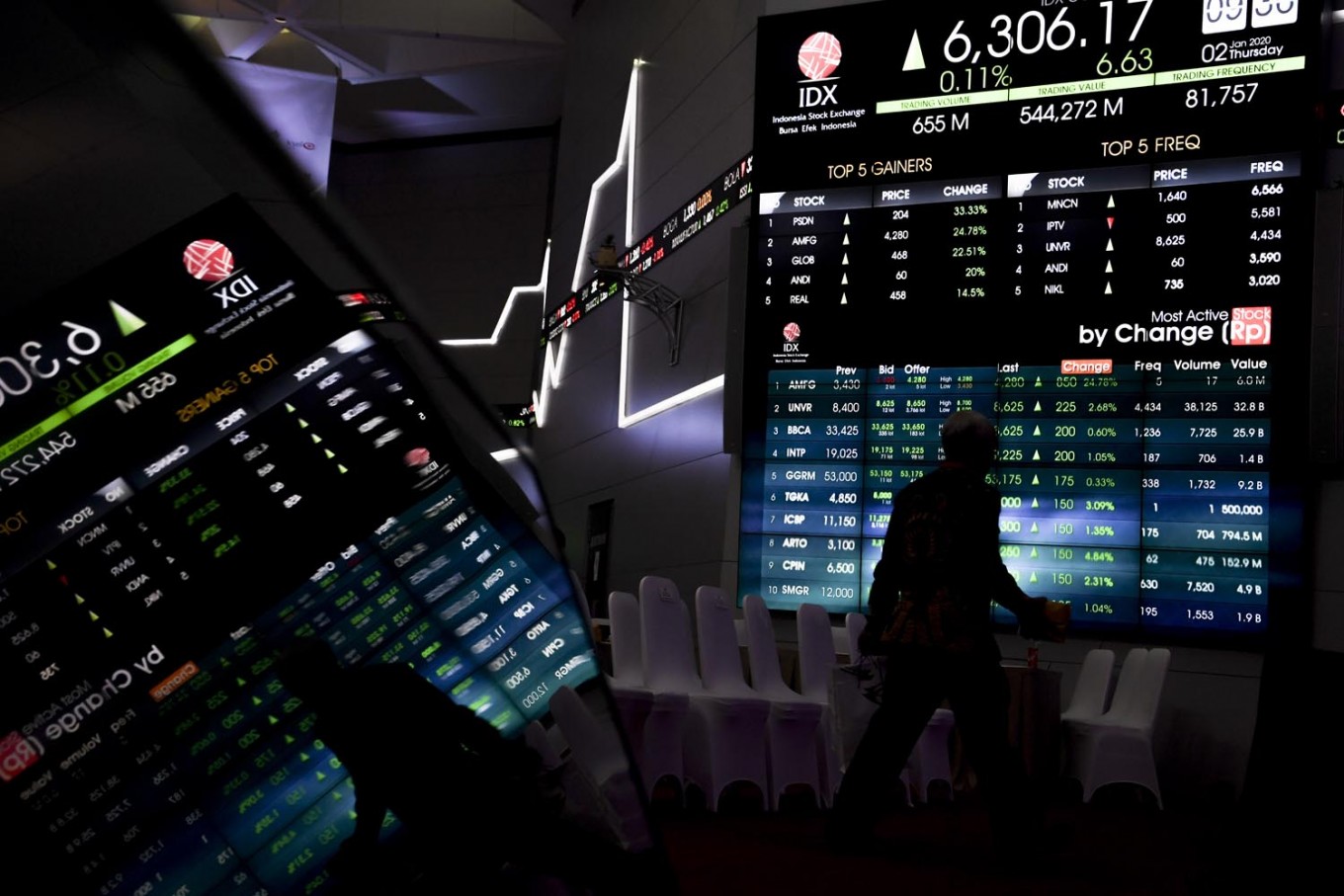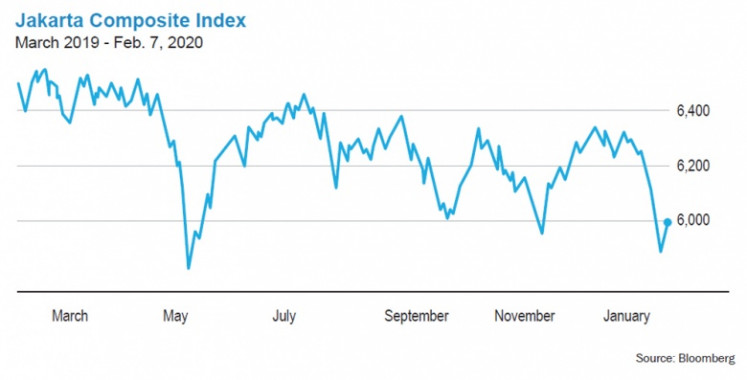Popular Reads
Top Results
Can't find what you're looking for?
View all search resultsPopular Reads
Top Results
Can't find what you're looking for?
View all search resultsDownward trend in share prices will not last long: Analysts
Change text size
Gift Premium Articles
to Anyone
 Pekerja berjalan di dekat monitor pergerakan bursa saham saat pembukaan perdagangan saham tahun 2020 di gedung Bursa Efek Indonesia, Jakarta, Kamis (2/1/2020). Pada awal perdagangan pertama tahun 2020, Indeks Harga Saham Gabungan (IHSG) dibuka naik 0,22 persen atau 13,59 poin di level 6.313,13. (Antara/Hafidz Mubarak A)
Pekerja berjalan di dekat monitor pergerakan bursa saham saat pembukaan perdagangan saham tahun 2020 di gedung Bursa Efek Indonesia, Jakarta, Kamis (2/1/2020). Pada awal perdagangan pertama tahun 2020, Indeks Harga Saham Gabungan (IHSG) dibuka naik 0,22 persen atau 13,59 poin di level 6.313,13. (Antara/Hafidz Mubarak A)
I
ndonesian stock prices appear to have bottomed out following a nearly 6 percent drop in January as investors feared the spread of the coronavirus, which started in China in late December 2019, would further drag down global economic growth.
The JCI, the main index at the Indonesia Stock Exchange (IDX), only gained a modest 1.7 percent in 2019 to close the year at 6,299 in the backdrop of sluggish economic growth. The index was under selling pressure through most of January due to fears over the impact of the coronavirus outbreak.
Declining by 5.7 percent in January to close the month at 5,940, the index showed signs of recovery at the start of February following growing optimism that the outbreak could be kept under control. The JCI gained ground in the last two weeks to close at 5,999 on Friday.
Most securities analysts believe share prices on the local market have bottomed out, with many countries now committed to halting the spread of the virus. As of Saturday, the deadly virus has killed more than 813 people worldwide, mostly in China, and infected more than 37,549 people in over 25 countries, according to the Johns Hopkins University Center for Systems Science and Engineering (CSSE).
“The drop in prices this month was mainly caused by panic selling amid fears over the spread of the coronavirus,” Artha Sekuritas Indonesia vice president Frederik Rasali told The Jakarta Post on Tuesday via text.
Read also: BI injects $1.8b to stabilize Indonesian markets as investors flee over coronavirus fears
Between Jan. 27 and Jan. 31, foreign investors recorded net sales of Rp 2.35 trillion (US$171 million), a sharp contrast to the transactions recorded during the same period last year, when foreign investors made net purchases of Rp 3.7 trillion.
The JCI’s fall contrasts with the upward trend typically recorded in January, known as the “January effect” — a phenomenon wherein investors go on a shopping spree during the first month of the year.
As documented by Bloomberg, between 2010 and 2020, the index’s performance fell only three times in the month of January. The index fell 7.95 percent in January 2011, 0.05 in January 2017 and 5.7 in January 2020. In other years, the index grew considerably, with the highest growth recorded in January 2019 at 5.46 percent.
“[The downward trend] will not last for the long term, of course, because governments of each country have responded swiftly [to the outbreak],” said Frederik, adding that he predicted the index would return to the 6,000 level following the release of full year financial reports for 2019, which typically occurs before the end of February.
Bank Negara Indonesia (BNI) Sekuritas’s head of research Kim Kwie Sjamsudin wrote in a report that during previous viral outbreaks, the market tended to bottom out several months after the first reported case.
“As investors tend to overreact during the onset of a virus outbreak, the subsequent rebounds have been quite swift as well,” Kim wrote, adding that the JCI’s current valuation level offered “an attractive risk to risk to reward proposition”.
Jakarta Composite Index (JCI) movement from March 2019 to Feb. 7, 2020. (JP/Bloomberg). Usage: 0 (JP/Bloomberg)The prices of big caps — those with market capitalization above Rp 20 trillion — have depreciated recently. On Friday, blue chip BNI shares dropped 4.85 percent month-to-month (mtm), while other big caps Astra International and Charoen Pokphand Indonesia fell 6.23 percent and 12.07 percent, respectively.
However, Trimegah Securities head of research and foreign institutional equity Sebastian Tobing said a number of stocks had not been affected by the coronavirus fears, such as Bumi Serpong Damai (BSD), which booked a 7.17 percent week-on-week increase.
Indonesia's stock market decline conforms to the global stock market movement, with stock markets around the world also seeing downturns.
Most share markets in Asia slipped on Friday, as the growing death toll and economic impact of the coronavirus outbreak put a lid on the week’s sharp rally, Bloomberg reported.
Read also: Coronavirus to affect stock market until contained: Analysts
MSCI’s broadest index of Asia-Pacific shares outside Japan fell 0.7 percent, Japan’s Nikkei and Korea’s KOSPI were in the red, Hong Kong’s Hang Seng fell 0.6 percent and the Shanghai Composite was 0.1 percent weaker.
Fears of the coronavirus outbreak, which has severely hurt the world’s second largest economy, also further undermined Indonesia’s economic growth, which has been stuck at about 5 percent for the past three years.
Investors began to sideline the market as fears mounted. The volume of stocks traded in the last week of January was recorded at only 40.82 billion shares, with a total value of Rp 32.23 trillion, far lower than the 75.99 billion shares valued at Rp 80.98 trillion recorded during the same period last year, according to the IDX data. (ydp)










